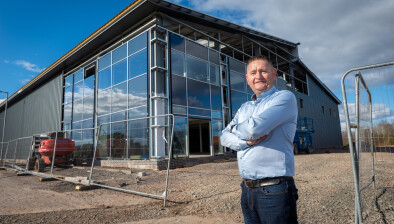Fraser Mitchell: Despite emergency measures, challenges remain for Scotland’s planning system
Fraser Mitchell, planning partner at Shoosmiths in Scotland, considers the impact of COVID-19 on Scotland’s planning system and notes that significant challenges remain to maintain an effective planning system during the lockdown and beyond.

Fraser Mitchell
The COVID-19 pandemic is continuing to present a multitude of new challenges for society and, in a business context, Scotland’s planning system is far from immune.
The ability to maintain a robust and effective planning system is an important pillar for supporting future economic growth. Consequently, the Scottish Government and the Scottish Parliament have moved swiftly to publish guidance and legislation to address the most pressing issues raised by the current pandemic.
This has included passing the Coronavirus (Scotland) Act 2020 that came into force last week (April 7), and within which there are emergency provisions for local authorities and the planning system.
New provisions in the legislation include the extension of time-limits for implementing planning permissions, and the guidance encourages flexibility by local authorities in connection with the enforcement of planning conditions and the payment of planning obligations. Moreover, further amendments will be forthcoming to existing Regulations in order to enable mandatory public consultation events to be carried out online.
These measures are welcome but issues remain, not least in terms of how planning authorities will deal with existing applications. In this regard, solutions must be found for two key problems. Namely, how can planning authorities validly carry out the statutory neighbour notification of new planning applications that they receive? Secondly, how can those applications be considered and determined within statutory timescales against a background of reduced resources within local authorities, a reduction in (or cancellation of) planning committees while lockdown measures remain in place, and en-masse home-working?
Admittedly, these may not be insurmountable issues, but the longer the current COVID-19 pandemic lasts, the more these thorny challenges will be brought into sharp focus.
In terms of processing applications, one option may be to extend statutory determination periods (currently two months for a local application and four months for a major application). In the absence of this, there is a real risk that developers may opt to appeal their major applications to the Scottish Ministers on the basis of non-determination. This may in time potentially create a significant backlog on larger-scale projects with a detrimental impact on the construction market and related sectors.
Notably, the Directorate of Planning and Environmental Appeals has already committed to progressing appeals where possible and doing so by way of written submissions, thereby reducing the time that appeals may otherwise take. This may provide developers with a greater likelihood of obtaining planning permission in the short to medium term, rather than leaving them to be determined by the council.
In terms of determining planning application, there is a general reluctance on the part of some local authorities to embrace virtual committee meetings (something that local authorities have the legislative power to do) and this factor may act as a further block to decisions being taken on major applications.
Of course, Scotland’s planning system is not only grappling with how best to consider and progress major planning applications. Oddly, the process of making neighbour notification of planning applications may present an even greater challenge.
Online notification is unlikely to work given the difficulty with obtaining all relevant email addresses, and physical notification would require planning officers to have ready access to the relevant notification forms and a reliable supply of stamps (or access to a post-office). These seemingly mundane points would ordinarily be easily performed, but clearly cannot be easily achieved in the current extraordinary circumstances.
There is no doubt that the market is slowing. However, significantly, there remains a steady developer demand to progress planning applications. In order to give local authorities the best opportunity to meet that demand (and potentially help to provide a stimulus for the economy in the months down the line) it will surely be in the interest of all stakeholders to prioritise identifying solutions to these challenges.
- Read all of our articles relating to COVID-19 here.













